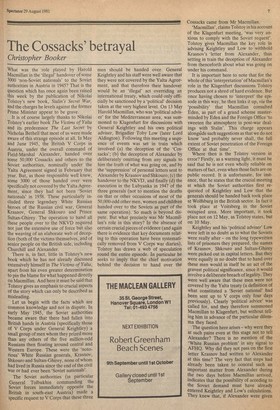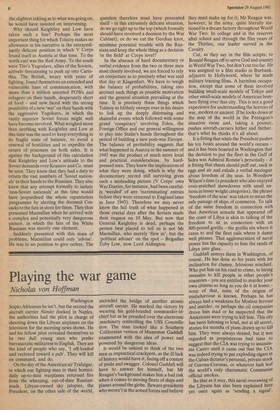The Cossacks' betrayal
Christopher Booker
What was the role played by Harold Macmillan in the 'illegal' handover of some 3000 'non-Soviet nationals' to the Soviet authorities in Austria in 1945? That is the question which has once again been raised this week by the publication of Nikolai Tolstoy's new book, Stalin's Secret War, and the charges he levels against the former Prime Minister appear to be grave.
It is of course largely thanks to Nikolai Tolstoy's earlier book The Victims of Yalta and its predecessor The Last Secret by Nicholas Bethell that most of us were made aware of this strange episode at all. In May and June 1945, the British V Corps in Austria, under the overall command of Field-Marshal Alexander, handed over some 50,000 Cossacks and others to the Soviet authorities, nominally under the Yalta Agreement signed in February that year. But, as those responsible well knew, some 3000 of those handed over were specifically not covered by the Yalta Agree ment, since they had not been 'Soviet nationals' in 1938. These particularly included three legendary White Russian heroes of the Russian civil war, General Krasnov, General Shkouro and Prince Sultan-Ghirey. The operation to hand all these people over to the NKVD required not just the extensive use of force but also the weaving of an elaborate web of decep tion (both of the victims themselves, and of senior people on the British side, including Churchill and Alexander.
There is, in fact, little in Tolstoy's new book which he has not already discussed extensively himself in The Victims of Yalta, apart from his even greater determination to pin the blame for what happened directly on Macmillan. And here it must be said that Tolstoy gives an emphasis to crucial aspects of the story which can only be described as misleading.
Let us begin with the facts which are common knowledge and not in dispute. In early May 1945, the Soviet authorities became aware that there had fallen into British hands in Austria (specifically those of V Corps under General Keightley) a small group of men whom they prized more than any others of the five million-odd Russians then floating around central and Western Europe. These were the 'notorious' White Russian generals, Krasnov, Shkouro and Sultan-Ghirey, none of whom had lived in Russia since the end of the civil war or had ever been 'Soviet nationals'.
The Soviet authorities (in particular General Tolbukhin commanding the Soviet forces immediately opposite the British in south-east Austria) made a specific request to V Corps that these three men should be handed over. General Keightley and his staff were well aware that they were not covered by the Yalta Agreement, and that therefore their handover would be an 'illegal' act overriding an international treaty, which could only officially be sanctioned by a 'political' decision taken at the very highest level. On 13 May Harold Macmillan, who was 'political adviser' for the Mediterranean area, was summoned to Klagenfurt for discussions with General Keightley and his own political adviser, Brigadier Toby Low (later Lord Aldington). Following this meeting a sequence of events was set in train which involved (a) the deception of the 'Cossacks'; (b) the deception of Alexander by deliberately omitting from any signals to him the truth of what was going on, and by the 'suppression' of personal letters sent to Alexander by Krasnov and Shkouro; (c) the handover to the NKVD, and finally (d) the execution in the Lubyanka in 1947 of the three generals (not to mention the deaths on that or other occasions of most of the 50,000-odd other men, women and children handed over to the Soviets as part of the same operation). So much is beyond dispute. But what precisely was Mr Macmillan's role in this story? In the absence of certain crucial pieces of evidence (and again there is evidence that key documents relating to this operation have been systematically removed from V Corps war diaries), Tolstoy has drawn a web of speculation round the entire episode. In particular he seeks to imply that the chief motivation behind the decision to hand over the Cossacks came from Mr Macmillan.
'Macmillan', claims Tolstoy in his account of the Klagenfurt meeting, 'was very anxious to comply with the Soviet request'. Tolstoy gives Macmillan the key role in advising Keightley and Low to withhold Krasnov's letter from Alexander, thus setting in train the deception of Alexander from thenceforth about what was going on under his command.
It is important here to note that for the whole of this 'interpretation' of Macmillan's role in the Klagenfurt discussions Tolstoy produces not a shred of hard evidence. But once having chosen to 'interpret' the episode in this way, he then links it up, via the 'possibility' that Macmillan consulted Eden, as part of a grand scheme masterminded by Eden and the Foreign Office 'to sweeten the atmosphere in post-war dealings with Stalin'. This charge appears alongside such suggestions as that we do not know 'and probably never shall, the full extent of Soviet penetration of the Foreign Office at that time'.
Where then is the Tolstoy version in error? Firstly, as a warning light, it must be said that he is not even wholly reliable on matters of fact, even when those facts are on public record. It is unfortunate, for instance, that he states that the crucial meeting at which the Soviet authorities first requested of Keightley and Low that the generals should be handed back took place at Wolfsburg in the British sector. In fact it took place at Voitsberg in the Soviet occupied area. More important, it took place not on 12 May, as Tolstoy states, but on 10 May.
Keightley and his 'political adviser' Low were left in no doubt as to what the Soviets were really after — on the long typewritten lists of prisoners they prepared, the names of Krasnov, Shkouro and Sultan-Ghirey were picked out in capital letters. But they were equally in no doubt that to hand over these men would in itself be an act of the gravest political significance, since it would involve a deliberate breach of legality. They were well aware that these men were not covered by the Yalta treaty (a definition of what constituted a 'Soviet national' had been sent up to V corps only four days previously). Clearly 'political advice' was called for, and they therefore summoned Macmillan to Klagenfurt, but without telling him in advance of the particular dilemma they faced.
The question here arises — why were they at such pains even at this stage not to tell Alexander? There is no mention of the 'White Russian problem' in any signal to AFHQ. Why did they not pass on the first letter Krasnov had written to Alexander at this time? The very fact that steps had already been taken to conceal such an important matter from Alexander during the two days before Macmillan arrived, indicates that the possibility of acceding to the Soviet demand must have already entered Keightley and Low's calculations. They knew that, if Alexander were given the slightest inkling as to what was going on, he would have insisted on intervening.
Why should Keightley and Low have taken such a line? Perhaps the most important thing for which Tolstoy makes no allowance in his narrative is the extraordinarily delicate position in which V Corps found itself in Austria at that time. To the north east was the Red Army. To the south were Tito's Yugoslays, allies of the Soviets, actively threatening to push up into Carinthia. The British, weary with years of fighting, found themselves on extended and vulnerable lines of communication, with more than a million assorted POWs and refugees on their hands, desperately short of food — and now faced with the strong possibility of a new 'war' on their hands with the aggressive Yugolsavs, in which the vastly superior Soviet forces might well have become involved. What weighed more than anything with Keightley and Low at this time was the need to keep everything in its fragile state of balance, to avoid a renewal of hostilities and to expedite the return of prisoners on both sides. It is against the background of this calculation that Keightley and Low's attitude to the Soviet demands over Krasnov and Co. must be seen. They knew that they had a duty to return the vast numbers of 'Soviet nationals' in their hands to the Russians. They also knew that any attempt formally to isolate 'non-Soviet nationals' at this time would have jeopardised the whole repatriation programme by alerting the doomed Cossacks to the fate in store for them. They thus presented Macmillan when he arrived with a complex and potentially very dangerous picture, in which the fate of the White Russians was merely one element.
Suddenly presented with this mass of problems, Macmillan could only 'advise'. He was in no position to give orders. The question therefore must have presented itself — in this extremely delicate situation, do we go right up to the top (which formally should have involved a decision by the War Cabinet), or do we cut the Gordian knot, minimise potential trouble with the Russians and keep the whole thing as a decision 'in the field' at Corps level?
In the absence of hard documentary or verbal evidence from the two or three men most closely involved, we are forced to rely on conjecture as to precisely what was said that day at Klagenfurt. We have to weigh the balance of probabilities, taking into account such things as possible motivation and the general situation prevailing at the time. It is precisely these things which Tolstoy so blithely sweeps over in his desire to link up the deeply distressing and shameful events which followed with some grand 'conspiracy' involving Eden, the Foreign Office and our general willingness to play into Stalin's hands throughout the period of building a new post-war Europe. The balance of probability suggests that what happened in Austria in the summer of 1945 was the product of much more local and practical considerations, by hardpressed men. They knew the implications of what they were doing, which is why the documentary ,record still surviving gives such a misleading picture (V Corps' own War Diaries, for instance, had been carefully 'weeded' of any 'incriminating' entries before they were returned to England later in June 1945). Therefore we may never know the full truth of what happened in those crucial days after the Soviets made their request on 10 May. But now that General Keightley is dead, perhaps the person best placed to tell us is not Mr Macmillan, who merely 'flew in', but the 'political adviser' on the spot — Brigadier Toby Low, now Lord Aldington.



































 Previous page
Previous page